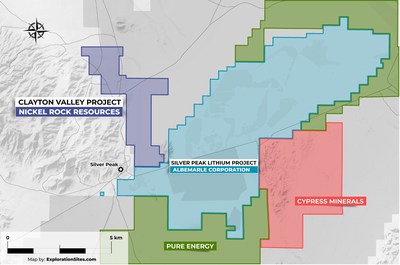Nickel Rock Announces Clayton Valley Lithium Project Exploration Program Results
Nickel Rock Resources Inc. (NIKLF) announced the results of its initial drilling program at the Clayton Valley Lithium Project in Nevada. The three reverse circulation holes totaled 356 meters, targeting lithium-bearing clay sediments. Results showed mixed outcomes, with the best interval from hole RCV-02 averaging 196 ppm Li, peaking at 332 ppm. The other holes faced drilling challenges, and one was terminated without assay results. The company plans to use the geological data gathered for future exploration phases.
- Initial drilling results show potential lithium values in the Clayton Valley project, particularly in hole RCV-02, which averaged 196 ppm Li.
- The exploration program provides critical geological data that can guide future exploration efforts.
- Drilling challenges led to early termination of hole RCV-01 and RCV-03, limiting assay data.
- Overall, mixed results indicate that more exploration is needed to assess the project's viability.
Insights
Analyzing...
VANCOUVER, BC, May 6, 2021 /PRNewswire/ -- Nickel Rock Resources Inc. ("the Company") (TSX-V: NICL), (OTCQB: NICKLF) is pleased to announce the analytical results of an initial exploratory drilling program on their Clayton Valley Lithium Project, Esmeralda County, Nevada, USA. This strategic land package, covering approximately 2,300 acres (930 ha), directly adjoins a western portion of lithium producer Albemarle's (NYSE: ALB) evaporation ponds and is nearby Cyprus Development Corp.'s (TSXV: CYP) 5,430-acre Clayton Valley Lithium Clay Project.
The exploration program consisted of three reverse circulation holes totaling 356 metres (1155 feet). The holes were intended to test the presence of lithium bearing clay members of the lakebed sediments.
Drillhole RCV-01, drilled to a depth of 130 metres (425 feet), designed to twin a geothermal gradient hole drilled by a previous explorer. Results of this hole correlated with the log of the previous hole including intervals of volcanic ash and dark green clay. The hole ended in alluvial gravel made up of metamorphic rocks shed from the Silver Peak Range. The hole did not reach the planned depth of 183 metres due to poor ground conditions but did assess the lake sediment target section. Assay results from this hole showed mixed results with only the top 6 meters (20 feet) of the hole returning more than 75 ppm Li. The average grade of the interval 0-6.1 metres was 309 ppm Li. Two water samples were collected from the borehole at 99 meters (325 feet) and 129 metres (425 feet) ran 31.4 and 41.0 mg/L Li, respectively.
Hole RCV-02 was drilled about 1260 meters north of RCV-01. RCV-02 was drilled to a depth of 136 metres (445 ft) and penetrated a section consisting primarily of rhyolitic volcanic ash and interbedded sediments. RCV-02 penetrated a 4.5 metre section of dark green clay from 105.1 to 109.7 metres (345-360 ft) before entering the metamorphic alluvium. Poor drilling conditions and high-water flows ended the hole before reaching the target depth but after successfully evaluating the lake sediment section.
Analytical results from this hole fared better than the RCV-01 with the interval 0 - 36.6 metres (0-120 feet) averaging 196 ppm Li. Within this interval, and from 18.3 to 25.9 metres (60 - 85 feet) an elevated Li zone was intersected averaging 279 ppm Li with the single best interval in this hole being 332 ppm between 18.3 and 19.8 m (60 - 65 feet). Water samples at 74.6 metres (245 feet), 105.1 metres (345 feet), and 137 metres (450 feet) ran 20.5, 21.0, and 32.8 mg/L Li, respectively.
Hole RCV-03 was designed to look for a perched section of volcanoclastic sediments beneath an alluvial fan. Previous water well logs indicated a layer of clay, ash, and silt beneath the alluvium and above the bedrock. While drilling, this hole encountered metamorphosed dolomite at a depth of 56 metres (185 feet) about the projected elevation of the sedimentary section. The hole lost circulation in an apparent karst horizon at 65.5 metres (215 feet) and was terminated at 79.2 metres (260 ft) without regaining sample return. Since the target sediments were not encountered, this hole was not assayed.
Drill chip samples were partially dried at the drill sites for two days in the case of RCV-01 and overnight in the case of RCV-02 before being picked up by a driver for Paragon Geochemical. The samples were transported to the Paragon laboratory on April 2 where they were dried, crushed, and pulverized. Analysis was by ICP- Mass Spectrometry following an aqua regia leach using a 0.5 gram sample aliquot.
Envelopes of standard material obtained from Minerals Exploration Geochemistry of Lamoille, Nevada were inserted into the sample stream at roughly 30.5 metres (100 foot) intervals. The eight standard samples returned lithium values ranging from 482 to 599 ppm Li with an average of 557 ppm Li. The analytical variability of about
Water samples were collected by the project geologist and delivered to the ALS Global sample preparation lab in Elko, Nevada April 5. Samples were filtered and analyzed by a combination of ICP-MS and ICP-OES methods by ALS Global. Standards were not inserted into the sample stream. A sample of drill make up water taken from the Silver Peak municipal well was used as a background sample; it ran 70 micro grams per liter (70 parts per billion).
Mr. Ali Alizadeh Company Director and a senior geologist with extensive experience in mineral exploration and project management comments "The Clayton Valley area is booming again for lithium clay exploration. With our current exploration program completed, we will be able to lay the groundwork for a more significant exploration program budget and program in the future. We are excited about this opportunity in Nevada for our lithium clay project and this reverse circulation drilling program has been helpful in identifying important geological information on the sedimentary layers. This will assist us in planning future exploration on our strategically located project next to Albemarle, Pure Energy and near Cypress Minerals in Clayton Valley".
Qualified person
The drilling was conducted under the supervision of Alan Morris, CPG, who serves as the project geologist and Qualified Person for this project and news release as defined by National Instrument 43-101. Mr. Morris has approved the technical information contained within this news release.
About Nickel Rock Resources Inc.
The Company is a Canadian-based mineral exploration company active in the exploration for nickel-iron alloy in British Columbia and lithium in Nevada. Nickel Rock Resources Inc. is a Canadian based exploration company whose primary listing is on the TSX Venture Exchange. The Company's maintains a focus on exploration for high value battery metals required for the electric vehicle (EV) market. (http://www.nickelrockresources.com/)
About Clayton Valley Lithium Project
Clayton Valley is a down-dropped closed basin formed by the Miocene age Great Basin extension and is still active due to movement along the Walker Lane structural zone. As a result, the basin has preserved multiple layers of lithium bearing volcanic ash, resulting from multiple eruptive events over the past 6 million years including eruptions from the 700,000-year-old Long Valley Caldera system and related events. These ash layers are thought to contribute to the lithium brines extracted by Albemarle and are also likely involved in the formation of the exposed lithium rich clay deposits on the east side of Clayton Valley. https://nickelrockresources.com/clayton-valley-lithium/
About the British Columbia, Canada Nickel Projects
The Mount Sidney Williams Group consists of five claim blocks in four groups with a total area of 6,125.32 hectares in the area surrounding Mount Sidney Williams, both adjoining and near the Decar project of FPX Nickel Corp., located 100 kilometres northwest of Fort St. James, B.C., in the Omineca mining division. Metallic mineralization includes nickel, cobalt, and chromium. At least some of the nickel mineralization occurs as awaruite. The Mitchell Range Group area claim consist of two contiguous claim blocks covering 3,134.70 hectares with demonstrated metallic mineralization including nickel, cobalt, and chromium. Nickel cobalt mineralization has not been well explored, but the presence of awaruite has been documented.
On Behalf of the Board of Directors
"Robert Setter"
Robert Setter, President & CEO
604- 428-5690
Neither the TSX Venture Exchange nor its Regulation Services Provider (as that term is defined in the policies of the TSX Venture Exchange) accepts responsibility for the adequacy or accuracy of this release. This news release may contain forward-looking statements which include, but are not limited to, comments that involve future events and conditions, which are subject to various risks and uncertainties. Except for statements of historical facts, comments that address resource potential, upcoming work programs, geological interpretations, receipt and security of mineral property titles, availability of funds, and others are forward-looking. Forward-looking statements are not guarantees of future performance and actual results may vary materially from those statements. General business conditions are factors that could cause actual results to vary materially from forward-looking statements.
Nickel Rock Resources Inc.
1220 – 789 West Pender Street
Vancouver, BC, Canada V6C 1H2
604- 428-5690
www.nickelrockresources.com
info@nickelrockresources.com
![]() View original content to download multimedia:http://www.prnewswire.com/news-releases/nickel-rock-announces-clayton-valley-lithium-project-exploration-program-results-301285291.html
View original content to download multimedia:http://www.prnewswire.com/news-releases/nickel-rock-announces-clayton-valley-lithium-project-exploration-program-results-301285291.html
SOURCE Nickel Rock Resources Inc.








